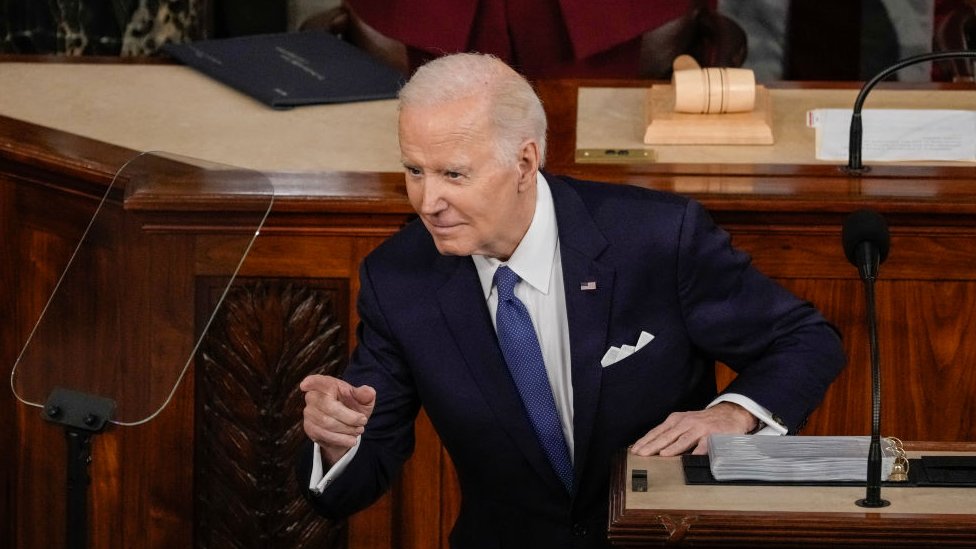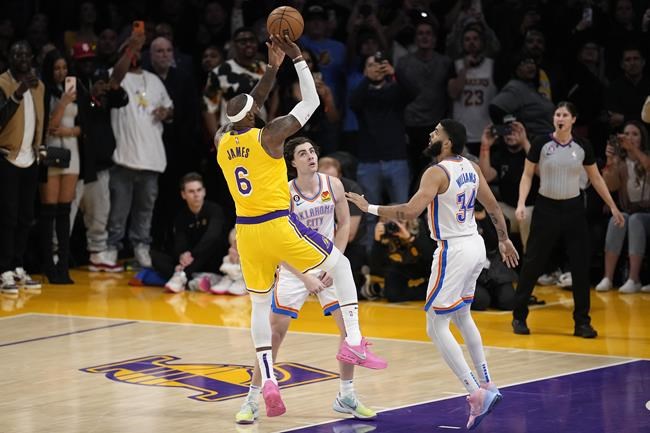Five Key Points from President Biden’s State of the Union Address
In Joe Biden’s State of the Union address, he focused on domestic issues, such as the economy, police reform, and gun control, rather than foreign policy. He made an attempt to work with Republicans, but tensions quickly arose when he proposed raising the debt ceiling. He also invited guests to the speech to provide emotional moments, and spoke out against “junk fees” that affect the everyday American. Ultimately, the speech focused on how Biden planned to move the country forward in the coming months.
Joe Biden delivered a spirited and sometimes combative State of the Union address at a pivotal moment in his presidency. It came as he was poised to launch a re-election campaign and faced Republicans controlling a chamber of Congress for the first time.
Here are five key takeaways from his evening in the spotlight, speaking to a fiercely divided Congress and an audience of tens of millions of Americans.
1. It was America first, foreign policy last
The Chinese surveillance balloon was big news in America over the weekend, but it was barely mentioned by the president in the bottom third of his speech.
“As we made clear last week, if China threatens our sovereignty, we will act to protect our country,” he said. “And we have.”
And that was it for the balloon talk.
Last year’s other major foreign policy story, Russia’s invasion of Ukraine, also received little attention. The President welcomed Ukraine’s Ambassador to the US to the grandstand and announced Allied support for the nation. But he did not take the opportunity to call for fresh aid to the war-torn nation.
The President made no mention of the recent earthquakes in Syria and Turkey – and the humanitarian crisis that is unfolding. Instead, the President’s focus is dominated by domestic concerns.
There is a saying that Americans only care about foreign policy when US soldiers are dying abroad. Joe Biden seems to have taken that to heart, at least in this speech.
2. It’s still the economy, fool
According to opinion polls, Americans care about the economy. And they broadly believe the nation is still struggling. When the nation recovers, they don’t feel it yet.
Mr. Biden’s speech was a high-profile attempt to change her mind, thereby increasing his chances of re-election.
He spoke of record low unemployment. He said inflation and high energy prices, which have been a focus on his approval ratings over the past 18 months, are now receding. And he discussed all the ways his past legislative achievements will help improve the country’s industrial base.
He then turned to a refrain he would use again and again – that it was time to “get the job done” and pass new legislation to boost the economy. It was an attempt to look to the future and offer a vision he can offer to Americans wondering what an 80-year-old president left in the tank.
3. Biden tried to play nice to Republicans
But if Mr. Biden is to finish his job in this political environment, he will need the help of Republicans.
The new face behind Joe Biden in this State of the Union address was Kevin McCarthy, the Republican Speaker of the House. And it served as a fairly accurate barometer of Mr. Biden’s attempts to persuade Republicans that they could be his partners in completing the job.
As the President boasted about cross-party achievements during his first two years in office, Mr McCarthy politely clapped his hands and even smiled occasionally. Among other things, the President referred to cooperation on infrastructure spending, high-tech investment in microchip manufacturing, military aid to Ukraine, federal protection of gay marriage and electoral reform.
“We’re often told that Democrats and Republicans can’t work together,” he said. “But over the last two years we’ve proved the cynics and the naysayers wrong.”
These naysayers predict that not much of substance will be done in the coming year as Republicans and Democrats clash over policy priorities. But for at least a few minutes, the President and Speaker played nice — and offered hope that dire predictions might be wrong.
4. He also started a fight (and got hooked)
It didn’t take long for all of that to collapse, however, as Mr. Biden turned his attention to raising the debt ceiling.
On the issue, Mr. Biden and House Republicans are engaged in a high-stakes chicken game with the US economy at stake. And the president showed no sign of blinking in his speech — and may have jabbed his Republican counterparts in the eyes.
Referring to Republican calls for tying a debt ceiling increase to spending cuts, Mr. Biden noted that no president has contributed more to the national debt than his predecessor, Donald Trump.
The Republicans reacted to this line with howls of derision.
Marjorie Taylor Greene at State of the Union
Then he tried to combine Republican calls for the debt limit with some conservative proposals to cut Social Security and Medicare — the popular state pension and health insurance programs.
Mr. McCarthy frowned, and the Republicans howled with anger. At the back of the chamber, Congresswoman Marjorie Taylor Greene — who had previously paraded through the halls of Congress in a white balloon — shouted that the President was a “liar.”
Earlier in the day, the speaker of the House of Representatives reportedly urged his Republican counterparts to shut up and heed the decency of Congress. As it turned out, it was a futile effort – and a revealing indication of the partisan hostility permeating this Congress.
5. Invited guests provided emotional moments
Like any State of the Union speech, Mr. Biden’s speech during his presidency included a laundry list of new processed proposals, most of which have little chance of becoming law.
He spoke emotionally about the need for police reform and new gun control legislation, pointing to the President’s guests in the stands — Tire Nichols’ parents and a hero of the Monterey Park mass shooting — to reinforce his points.
“All of us in the Chamber must rise to this moment,” he said. “We cannot turn away.”
The reality, however, is that neither effort has much of a chance of succeeding. When Congress convenes on new legislation, there’s a better chance of tackling the “junk fees” the president railed against, including bank surcharges, resort fees and airline seat fees.
“Junk charges may not matter to the very wealthy, but they do matter to most people in homes like the one I grew up in,” he said.
American politicians may be unable to agree on how to deal with police brutality and gun violence, they may be stuck on the debt ceiling and disinterested in foreign policy, but no one likes Ticketmaster fee fees.
Don’t miss interesting posts on Famousbio









